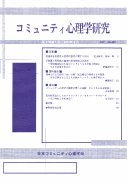Volume 5, Issue 1
Displaying 1-5 of 5 articles from this issue
- |<
- <
- 1
- >
- >|
Original Articles
-
2001Volume 5Issue 1 Pages 1-10
Published: September 30, 2001
Released on J-STAGE: October 30, 2021
Download PDF (451K) -
2001Volume 5Issue 1 Pages 11-22
Published: September 30, 2001
Released on J-STAGE: October 30, 2021
Download PDF (609K)
Case Reports
-
2001Volume 5Issue 1 Pages 23-38
Published: September 30, 2001
Released on J-STAGE: October 30, 2021
Download PDF (848K)
Keynote Speech
-
2001Volume 5Issue 1 Pages 39-48
Published: September 30, 2001
Released on J-STAGE: October 30, 2021
Download PDF (516K) -
2001Volume 5Issue 1 Pages 49-69
Published: September 30, 2001
Released on J-STAGE: September 17, 2020
Download PDF (1011K)
- |<
- <
- 1
- >
- >|
